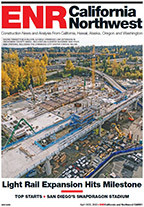Opponents of California’s high-speed rail project have managed to stop the state from selling at least $8 billion in bonds to fund the initial construction phase after a California Superior judge made several rulings in their favor Nov. 25, but the High-Speed Rail Authority remains confident that the project will eventually be completed.
“The Authority intends to comply with the rulings as directed. No one said this would be easy. [As with] all transformative projects, we knew there would be challenges. But the bottom line is that all the issues raised by the judge are fixable and we intend to fix them,” says Dan Richard, chair of the High Speed Authority board of directors.
Tutor Perini/Zachry/Parsons, a joint venture, was awarded the design-build contract for the first segment in August. The 29-mile stretch would run between Madera and Fresno.
In a series of rulings, Sacramento Superior Court Judge Michael Kenny blocked the selling of bonds that would finance some of the initial $1.2 billion in work contracts for Caltrans and the group led by Tutor-Perini. He did not invalidate the contracts, however, saying that action was possible, if necessary, at a later date. Spending that survived the ruling is $675 million for pre-construction and planning as well as $225 million in administrative costs.
The major roadblock imposed on the authority by the judge’s ruling is that it must identify the funding source for the state’s share of the $68.4-billion project before it can spend a voter-authorized bond limit of $9.1 billion. With matching federal funds, the state’s share is believed to be about $31 million.
The California High-Speed Rail Authority has not yet identified potential funding although it has pursued both private financing and appropriations from the state legislature. Bills both to fund and to terminate the project are expected to be introduced into the California Assembly in the next session, which begins Jan. 6.
Known as Tos v. California High-Speed Rail Authority, the case was filed in 2011. The plaintiffs, a farmer, a rural homeowner and Kings County, asked the court to to strip the High-Speed Rail Authority's access to bonds because it failed to meet the statutory requirements of Proposition 1A, specifically that it operate without a subsidy.
“It’s important to keep in mind that the judge took a lot of our opponents’ objections off the table,” says Richard. “He rejected their challenges to the Caltrans State Route 99 contract and the design-build contract for Construction Package 1. He also rejected their demand for a restraining order or injunction to stop the project. These legal challenges are coming from a small group of opponents who want to kill the project. They don’t want to improve it or seek legal compliance. They just want to stop it.”
Opponents say the ruling is merely an extension of the will of voters who passed Proposition 1A under the assumption that the project would not stall if costs became too onerous due to a lack of investment and interest.
“The financial protections of Proposition 1A have served their purpose well. Our litigation to enforce those provisions will protect the state from financial risk. Our clients are very pleased,” said lead counsel for the plaintiffs, Michael Brady.


Post a comment to this article
Report Abusive Comment